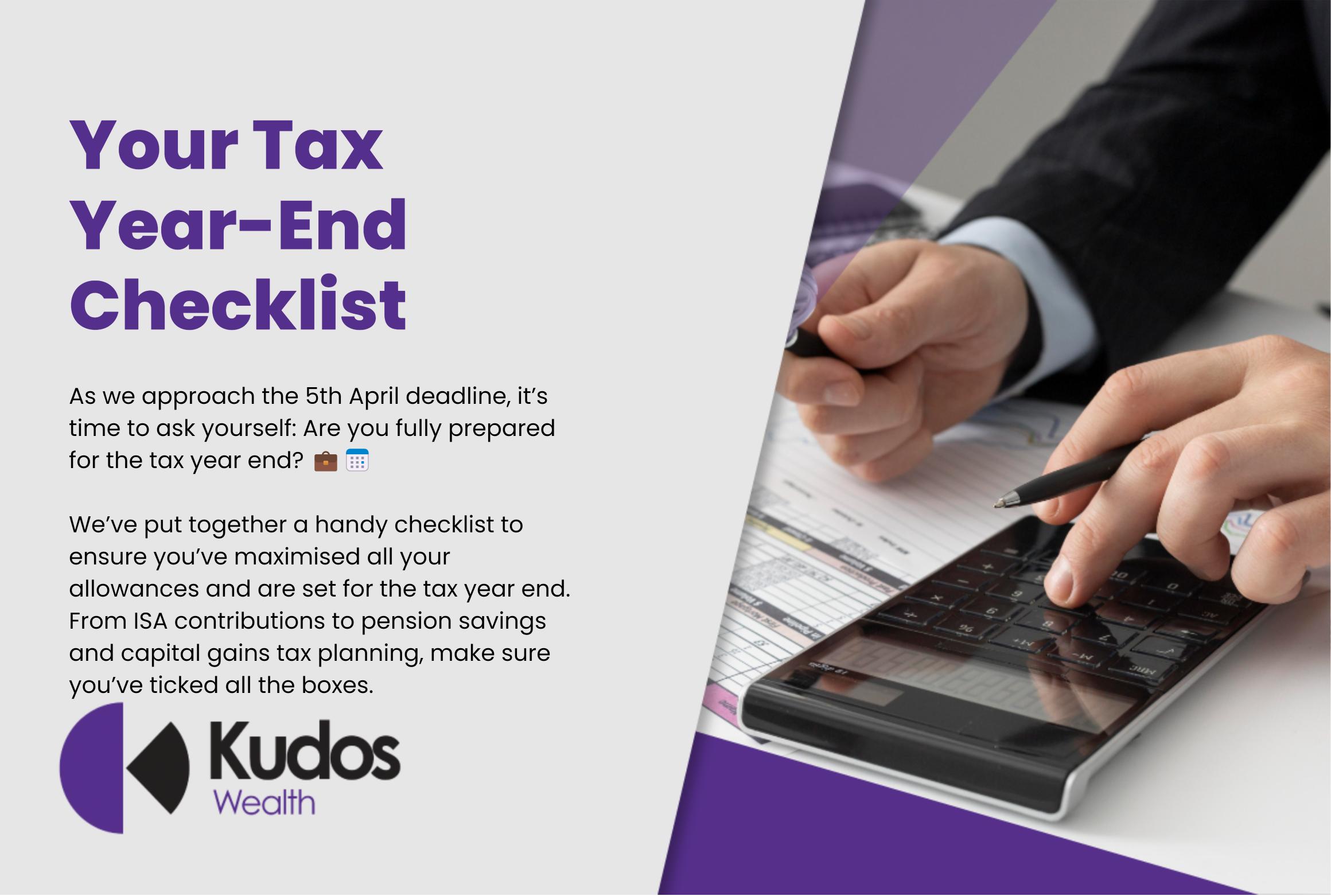

As the tax year draws to a close, it’s crucial to ensure you’re making the most of your available tax reliefs and allowances. Effective tax planning is not just about compliance; it’s a strategic step towards creating the financial future you envision. Whether your goals include helping your children onto the property ladder, upgrading your home, or securing a worry-free retirement, understanding how to utilise your tax allowances can significantly impact your ability to achieve these dreams. Here’s your essential tax year-end checklist:
The Individual Savings Account (ISA) remains one of the most tax-efficient ways to save. With a generous allowance of £20,000 for the 2023/24 tax year and £9,000 for the Junior ISA, are you fully utilising these opportunities? ISAs offer a tax-free environment for your savings and investments, making them a cornerstone of any savvy saver’s strategy.
While the Personal Savings Allowance offers a tax-efficient way to earn interest on your savings, balancing this with your ISA allowance is key. Have you struck the right balance between maintaining an accessible cash fund and maximising your ISA contributions? This blend is crucial for both short-term liquidity and long-term growth.
Pensions are not just about saving for retirement; they’re a powerful tool for tax planning. Contributions to your pension can reduce your taxable income, potentially lowering your tax bill today while building your nest egg for the future. Are you contributing enough to make the most of these benefits?
Inheritance Tax (IHT) planning is a critical consideration for many. By gifting up to £3,000 before the 5th of April, you can immediately reduce the taxable value of your estate, mitigating the future IHT burden. This allowance refreshes annually, so failing to use it is a missed opportunity.
With changes to the Capital Gains Tax-free threshold on the horizon for the 2024/25 tax year, now is the time to review your investments. Realising gains in a tax-efficient manner can minimise your tax liability, ensuring you don’t pay more than necessary. Are you prepared for these changes?
Receiving dividends within an ISA can shield them from tax, maximising your investment returns. However, with the upcoming reduction in dividend allowances, it’s more important than ever to consider how this will affect your investment strategy. Are your investments structured in a way that minimises your tax liability?
Tax planning is an integral part of securing your financial future and achieving your dreams. Whether you’re aiming to support your children’s ambitions, enhance your lifestyle, or ensure a comfortable retirement, taking full advantage of your tax allowances and reliefs is essential. As we approach the end of the tax year, take the time to review your finances and make any necessary adjustments. Remember, careful planning today can pave the way for a brighter, more secure tomorrow.
For personalised advice and strategies tailored to your unique financial situation, consider consulting with a financial adviser. Together, you can navigate the complexities of tax planning and make informed decisions that align with your long-term goals.
An Individual Savings Account (ISA) is a tax-efficient savings vehicle available in the UK. The importance of an ISA lies in its ability to shield your savings or investments from income tax, dividend tax, and capital gains tax. With annual allowances provided (£20,000 for adults and £9,000 for children under the Junior ISA scheme), maximising your ISA contributions can significantly enhance your ability to grow your wealth tax-free.
The Personal Savings Allowance (PSA) allows you to earn a certain amount of interest on your savings without paying tax. For basic rate taxpayers, the allowance is £1,000, and for higher rate taxpayers, it’s £500. Additional rate taxpayers do not receive a PSA. Balancing your savings between ISAs and other savings accounts, considering your PSA, can optimise your tax efficiency.
No, ISA allowances work on a “use it or lose it” basis. You cannot carry forward any unused portion of your £20,000 ISA allowance into the next tax year. This makes it crucial to utilise your full allowance before the tax year ends on April 5th, if possible.
Contributing to a pension scheme offers several tax benefits, including tax relief on contributions, tax-free growth of your pension pot, and a tax-free lump sum of up to 25% of your pension value upon retirement. Pension contributions can also reduce your taxable income, potentially lowering your overall tax liability.
There are several strategies to reduce a potential IHT bill, including making use of the £3,000 annual gift allowance, which immediately reduces the value of your estate for IHT purposes. Other strategies include gifting assets during your lifetime, setting up trusts, and investing in IHT-efficient investments. Planning ahead with these strategies can significantly reduce the IHT burden on your estate.
The government periodically reviews and adjusts the Capital Gains Tax (CGT) allowance. For the upcoming tax year, it’s important to stay informed about any reductions or adjustments to the tax-free threshold, as this can affect your tax planning strategies, especially when deciding to sell or dispose of assets.
Dividends received above the dividend allowance (which is set to be reduced in the 2024/25 tax year) are subject to tax at dividend tax rates, which vary depending on your income tax band. Holding dividend-generating investments within an ISA can shield these dividends from tax, enhancing your investment returns.
Contact us today to see how we can help.





Residential Mortgage

Commercial Mortgage

Pensions & Investments

Protection & Insurances

Health Questionairre

Asset Finance

Business Finance

Invoice Finance

Residential Mortgage

Commercial Mortgage

Personal Details Form

Business Details Form

Tax Return Information

Residential Mortgage

Commercial Mortgage

Pensions & Investments

Protection & Insurances

Health Questionairre

Asset Finance

Business Finance

Full Business Finance Review

Invoice Finance